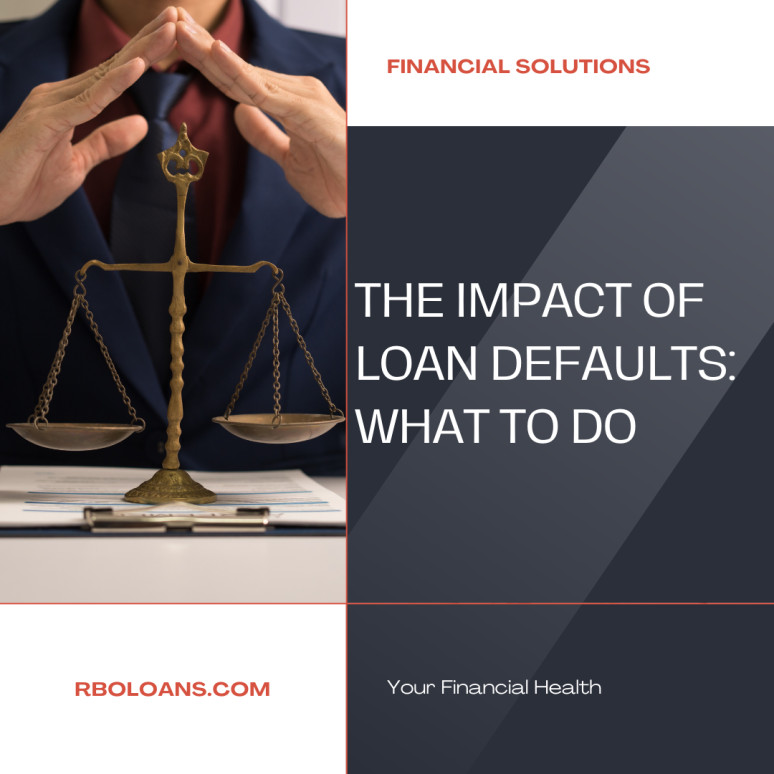The Impact of Loan Defaults: What to Do

When someone borrows money, the expectation from both the borrower and the lender is that the loan will be repaid according to agreed-upon terms. However, life's unpredictability can throw a wrench into even the best-laid plans, leading to what is known as a loan default.
A loan default occurs when a borrower fails to pay back a loan as per the agreement with the lender. This scenario can have far-reaching implications for both parties involved, affecting financial health and future opportunities. Understanding the impact of loan defaults and knowing the steps to take if faced with such a situation is crucial for financial stability.
Understanding Loan Defaults
What Is a Loan Default?
At its core, a loan default is the failure to meet the legal obligations of a loan agreement. This typically occurs when a borrower does not make scheduled payments on time. Loans can range from personal and auto loans to mortgages and student loans, each with its terms and conditions.
How Loans Work
Loans are based on the principle of borrowing a specific amount of money (the principal) and agreeing to repay that amount, plus interest, over a predetermined period. Interest is the cost of borrowing and is how lenders make a profit. Payments are usually made monthly and consist of a portion of the principal plus interest.
Common Reasons for Loan Defaults
Loan defaults don't just happen out of the blue. They are often the result of several common factors, including:
- Financial hardship: Job loss, unexpected medical bills, or any sudden financial burden can disrupt one’s ability to make timely payments.
- Overborrowing: Taking on more debt than one can afford to repay can lead to a financial squeeze, making defaults more likely.
- Lack of understanding: Sometimes, borrowers do not fully grasp the terms of their loans, such as the interest rate, repayment schedule, and penalties for late payments.
Understanding why defaults happen is the first step in preventing them. With this foundation, we can now explore the immediate impacts of loan defaults.
The Immediate Impact of Loan Defaults
On Borrowers
- Credit Score Damage: One of the most immediate effects of a loan default is the negative impact on a borrower's credit score. Late payments and defaults are reported to credit bureaus, leading to a significant drop in credit scores. This decrease affects borrowers' ability to secure loans in the future, increases the cost of borrowing, and can even influence job opportunities in some cases.
- Increased Financial Strain: Defaulting on a loan often results in additional financial burden. Lenders may impose late fees, increased interest rates, and penalties, adding to the debt load. In cases of secured loans, such as auto loans or mortgages, the lender might also seize the collateral (car or home) to recoup their losses.
- Legal Consequences: Lenders have the right to take legal action against borrowers who default on their loans. This can lead to lawsuits, wage garnishment, or a court order requiring the borrower to pay the outstanding debt.
On Lenders
- Financial Loss: Although lenders may recover some losses through late fees, increased interest rates, or seizing collateral, loan defaults can still result in financial loss, especially if the value of the collateral has depreciated or if the borrower has insufficient assets.
- Recovery Processes: Lenders may engage in recovery processes, including hiring collection agencies to recover the debt. These processes are not only costly but also time-consuming, diverting resources from other potentially profitable activities.
Long-Term Consequences for Borrowers
- Difficulty in Obtaining Future Loans or Credit: A history of loan default significantly tarnishes a borrower's credit history, making it challenging to obtain future loans or credit. Lenders view such individuals as high-risk, often resulting in loan denials or higher interest rates for approved loans.
- Legal Actions and Wage Garnishment: If lenders pursue legal action, borrowers might face wage garnishment, where a portion of their paycheck is directly sent to the lender until the debt is paid off. This not only affects financial stability but also public record, which can be damaging personally and professionally.
- Impact on Personal and Financial Reputation: Beyond the financial implications, defaulting on a loan can harm a borrower's reputation, affecting relationships with future lenders, employers, and even within personal relationships. The stigma of financial unreliability can have far-reaching effects.
The immediate and long-term consequences of loan defaults highlight the importance of managing loans responsibly and understanding the potential ramifications of defaulting. However, all is not lost for those facing financial difficulties. In the next sections, we will explore preventive measures and actionable steps for those struggling with loan payments, offering hope and solutions for recovery.
Preventive Measures
Avoiding loan default starts with responsible financial planning and understanding the commitments of a loan. Here are some key strategies to prevent falling into default:
- Financial Planning and Budgeting: Create a detailed budget that accounts for all income, expenses, and debt repayments. This helps in identifying potential financial shortfalls and areas where expenses can be reduced to ensure timely loan payments.
- Understanding Loan Terms: Before taking on any loan, it's crucial to fully understand the terms, including interest rates, repayment schedules, and penalties for late payments.
- Emergency Fund: Building an emergency fund can provide a financial cushion that helps in managing unexpected expenses without derailing loan payments. Aim to save enough to cover three to six months of living expenses.
- Regular Financial Reviews: Periodically review your financial situation to adjust your budget and savings goals as necessary. This proactive approach can help in identifying potential financial challenges early on.
- Seeking Financial Advice: If you find yourself struggling to keep up with payments, don't wait until it's too late. Seek advice from a financial advisor or a credit counseling service.

What to Do If You're Facing Loan Default
For those who are on the brink of default or have already defaulted, there are still steps that can be taken to mitigate the situation:
- Contact Your Lender Immediately: Lenders are often willing to work with borrowers facing financial difficulties. They may offer options such as loan modification, forbearance, or extended repayment terms to help you manage your payments.
- Explore Restructuring Options: Depending on the type of loan, restructuring the debt might be possible. This can involve renegotiating the loan terms to make the payments more manageable.
- Understand Your Legal Rights: Familiarize yourself with your rights as a borrower. Laws and regulations, such as the Fair Debt Collection Practices Act, provide certain protections against abusive collection practices.
- Seek Professional Help: Consider consulting with a financial advisor or a credit counselor. These professionals can offer guidance on debt management plans, budgeting, and even negotiating with creditors on your behalf.
- Consider Debt Consolidation: If you have multiple loans, debt consolidation can simplify your payments and potentially lower your overall interest rate. However, this option requires careful consideration and might not be suitable for everyone.
- Prioritize Your Debts: Focus on making at least the minimum payments on all your debts.
Conclusion
Loan defaults can have severe consequences on an individual's financial health and overall well-being. However, by understanding the implications, taking preventive measures, and knowing what steps to take if faced with default, it's possible to navigate through these challenges.
The key is to act proactively, whether in managing your debts or seeking assistance when difficulties arise. Financial hardships can be overwhelming, but with the right approach and resources, overcoming them is within reach. Remember, the goal is not just to manage loan defaults but to build a solid financial foundation for the future.


-small.jpg)
-small.jpg)

-small.jpg)